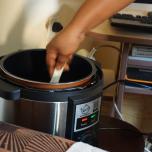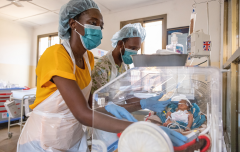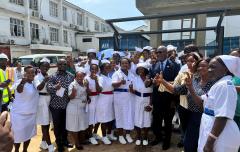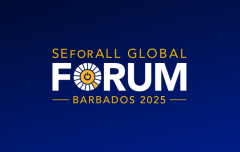ToR: Development of Communication Materials for Clean Cooking Transition in Schools in Tanzania
1. SEforALL Background
Sustainable Energy for All (SEforALL) is an international organization working with leaders in government, the private sector and civil society to drive further, faster action toward achievement of Sustainable Development Goal 7 (SDG7), which calls for universal access to sustainable energy by 2030, and the Paris Agreement, which calls for reducing greenhouse gas emissions to limit climate warming to below 2° Celsius.
Achieving these goals will require a radical rethink of the way we produce, distribute, and consume energy. SEforALL is at the heart of this foundational shift to ensure no one is left behind. Drawing on data and evidence, we identify a critical path to success in achieving SDG7.
Former UN Secretary-General Ban Ki-moon launched the Sustainable Energy for All initiative in 2011. Now an independent organization, we maintain close links with the UN, including through a relationship agreement, partnerships with UN agencies and with SEforALL's CEO acting as the UN Secretary-General's Special Representative for Sustainable Energy for All and Co-Chair of UN-Energy. These roles include advising the UN Secretary General and his staff on issues relating to sustainable energy and the implementation of SDG7 and supporting the coordination of sustainable energy issues in the United Nations system.
The ambitions of SDG7 are extraordinary. Aiming to achieve them in the context of the Paris Agreement on climate change involves transformation at a scale never undertaken before. Swift action must be taken by Leaders in governments, private sector companies, institutions, financiers, development banks, unions, communities, entrepreneurs, and civil society. As we enter the final decade to achieve SDG7, SEforALL has strategically chosen to strengthen global agenda-setting while expanding its activities to an engagement model that prioritizes data-driven decision-making, partnerships with high-impact countries and implementation on the ground. The new SEforALL three-year business plan outlines “results offers” that scope out our planned interventions and demonstrate to our funding partners the impact of their support.
2. Context
Over 2.1 billion people globally, including a large portion of Tanzania's population, lack access to clean cooking solutions, relying instead on traditional biomass and polluting fuels. This dependence leads to severe health risks, particularly for women and children, causing 3.2 million premature deaths annually, more than tuberculosis, malaria, and AIDS combined. Traditional cooking methods also contribute to significant environmental harm, including deforestation and carbon emissions.
In response to these challenges, Tanzania has recently launched the National Clean Cooking Strategy 2024-2034, which sets an ambitious target of achieving 80% clean cooking access across the country. This strategy underscores the government's commitment to reducing reliance on biomass and promoting modern, sustainable cooking solutions. Complementing this, H.E. President Samia Suluhu Hassan has issued a specific mandate requiring all public institutions that feed more than 100 people to stop using firewood and charcoal and transition to clean energy for cooking. This directive from the president highlights Tanzania’s prominent role in the global sphere as, not only a national advocate for clean cooking but also a global leader and is a critical step toward accelerating the adoption of clean cooking technologies in Tanzania.
In Tanzania, with 17,686 government primary schools and over 11 million students, there is a pressing need for change. Surveys by the World Food Programme (WFP) in 2023 revealed that approximately 9,200 schools operate feeding programs, with 99% relying on firewood for cooking. However, around 5,600 of these schools are connected to the national grid, offering a prime opportunity to introduce electric cooking (eCooking) solutions. This presents a pivotal moment to implement sustainable and clean cooking solutions, leveraging existing infrastructure to catalyse positive change in cooking practices in Tanzanian public institutions.
Sustainable Energy for All (SEforALL) and the World Food Programme (WFP) have announced an innovative partnership focused on bringing clean and efficient electric cooking solutions to government primary schools in Africa, helping them shift away from polluting and harmful cooking methods currently used for preparing student meals.
Transitioning schools to clean, affordable and reliable cooking solutions, such as electric cooking (eCooking), improves the health of students, teachers and cooks by reducing their exposure to air pollution generated in school kitchens. It also improves wider economic and social outcomes, for example by eliminating time spent collecting firewood, while protecting the environment from emissions and deforestation from firewood use. The partnership will first focus on implementing projects in four selected regions of Tanzania, namely Dar es Salaam, Dodoma, Kigoma and Tabora.
SEforALL and WFP, together with the Government of Tanzania with support from the UKAid-funded Modern Energy Cooking Services (MECS) programme, have already begun work on creating an eCooking programme in Tanzania that targets an initial 50 schools. These are primary schools with school feeding programmes that are connected to the national electricity grid, which offers an immediate opportunity to provide clean eCooking solutions that will feed more than 25,0000 students. Beyond the initial 50 schools, the partnership has identified more than 5,000 grid-connected schools in Tanzania for potential expansion of the programme, with more expected to join as electrification extension progresses. Using learnings from Tanzania, WFP and SEforALL will look to scale the programme to other countries as well. The partners have the ambition of reaching 10,000 schools and 5 million children globally in the next 3 years and are calling for an investment of about USD 100 million combined with carbon financing, to achieve this target.
As the following outreach campaign in schools is being developed and delivered, it is essential to align it with 1. The National Clean Cooking Communication Strategy, and 2. The National Awareness-Raising Campaign for eCooking in Tanzania being conducted by MECS to maximize synergies. This alignment will be key to driving the broader adoption of eCooking across Tanzania.
3. Objective
The objective of this TOR is to engage a firm to support the developing and creating communications materials aimed at driving the adoption of electric cooking (eCooking) in schools across Tanzania. This initiative is part of the SEforALL-WFP initiative, Accelerating a Clean Cooking Transition in Schools.
The developed communications materials should serve several key objectives: raise awareness about clean cooking and related environmental topics among key beneficiaries and stakeholders, such as, government actors, school headmasters, cooks, children, and parents; support the adoption of eCooking in schools through clear, accessible training materials for school cooks; and position schools as drivers of innovation. Additionally, these materials should empower students to act as agents of change by equipping them with the knowledge and resources to advocate for clean cooking solutions within their schools and the broader community, inspiring widespread adoption of sustainable practices.
4. Scope of Work
To deliver on the above stated objectives and workstreams, the selected firm will undertake the following tasks:
4.1 Workplan and Strategy
- Develop and propose a project workplan and strategy: Collaborate with the SEforALL team, pre-identified schools, and relevant stakeholders to design a strategic approach and detailed action plan. The workplan must be tailored to the specific needs and context of the target audience, ensuring that the proposed materials and anticipated outcomes are relevant to the local setting. All content should be culturally and contextually appropriate for Tanzania, aligning with the needs of the communities involved.
4.2 Content Development
- Education package for students and teachers: This package will include the design and printing of materials tailored for students, addressing broader topics such as climate, energy, environment, and clean cooking, with content specifically adapted for a younger audience. Additionally, the package will include supporting materials for teachers, providing guidance on how to effectively communicate these topics to students. e.g. booklets, children’s books, animations, comics, and interactive materials.
- Training materials for cooks and eCookbook for schools: Create an eCookbook tailored specifically towards school feeding (see MECS eCookbook series or equivalent) featuring step-by-step cooking instructions for up to 10 different meals prepared with Electric Pressure Cookers (EPCs) in schools.
- Additionally, in collaboration with the stove manufacturer, develop a user manual in both English and Swahili that offers clear, detailed instructions on the proper use, care, and maintenance of EPCs, ensuring safe and efficient operation.
- Demonstration materials: Design, create and print flyers, posters, and other promotional materials to be used at events, such as cooking demonstrations in schools and markets. These materials should be designed to attract and engage parents and community members, raising awareness and encouraging participation in the initiative.
4.3 Training and handover of materials to SEforALL and partners
- Provide training to implementing partners on how to effectively use the produced materials, along with a formal handover. This should include access to an online repository containing all materials in an editable format.
5. Approach, Timeline, and Deliverables
Approach: The selected firm will maintain close contact with a designated SEforALL contact(s) throughout the assignment to facilitate access to documentation, relevant SEforALL staff, and other partners as and if needed. All draft reports and deliverables will be approved by SEforALL.
The selected firm should make a concerted effort to mainstream gender considerations throughout this assignment. This includes following gender parity when looking for candidates. Furthermore, the firm is encouraged to implement a 40:60 female to male ratio in their team.
Deliverables and Timeline:
The deliverables for the Development of Communication Materials for Clean Cooking Transition in Schools in Tanzania assignment are placed below. The deliverables must be provided both in English and Swahili.
Bidders are required to submit a proposal encompassing all activities.
| No. | Deliverable | Indicative Timeline |
|---|---|---|
| 1 | Inception Report: A detailed report outlining the proposed materials, communication channels, formats, style, and approach. | Week 2 (Mid – Nov. 2024) |
| 2 | Content Development:
| Week 8-10 |
| 3 | Finalization of Assignment Handover and Training of Material: Workshops to train SEforALL and its implementing partners on how to best use the developed materials and an online repository containing all materials in an editable format. | Week 12 End Jan. 2025 |
6. Travel
Travel to the selected target region(s) - (Dar es Salaam, Dodoma, Kigoma, Tabora) may be required and will require a potential contract amendment.
7. Eligibility Criteria and Qualification Requirements
7.1 Eligibility Criteria
- Registered company/legal entity in Tanzania with a minimum of 3 years’ experience in the subject area (scanned copy of the Certificate of Incorporation to be submitted).
- The service provider/company must be eligible to work in Tanzania.
- Completed and signed SEforALL Bank Details Form.
- Statement of Confirmation.
7.2 Qualification Requirements and Expertise
The applying organization must demonstrate the following criteria:
- Strong project management skills, with experience in phased project implementation and the ability to meet deadlines in multi-stakeholder environments.
- Demonstrated experience delivering similar projects on time and within budget, ensuring high-quality outputs.
- Demonstrated understanding of the local cultural and social context in Tanzania, especially as they pertain to engaging local communities and educational facilities.
- Demonstrated expertise in developing culturally appropriate communicational/educational materials for diverse age groups, especially younger audiences in primary and secondary schools will be considered an added advantage.
- Previous partnerships or work experience with stakeholders in Tanzania, such as government agencies, NGOs, or educational institutions.
- Demonstrated proficiency in both English and Swahili
7.3 Qualification and Experience Requirements for the Team
i. Team Leader: The Team Leader will be responsible for managing all the activities envisaged under this contract, assessing the quality of the submitted reports and drafts, and communicating progress achieved during the implementation of the activities on a regular basis.
8. Bidding Process
Proposals can also be submitted as a single entity and consortia. Interested and qualified bidders must submit one Technical Proposal and one Financial Proposal as separate documents. Proposals must be submitted either in PDF of PPT format and should include the following:
Technical Proposal
- Brief background about your organization.
- The organization’s experience in carrying out similar work including relevant skills, qualifications, and knowledge.
- Your understanding of the assignment, approach/methodology as well as proposed workplan. Any deviations from the Terms of Reference should be clearly indicated.
- Three (3) relevant organizational/client references.
- CVs of key personnel.
Financial Proposal, outlining the costs associated with carrying out the scope of work, including:
- Labour costs (personnel, daily rates, LOE).
- Equipment costs (if any).
- Other costs.
- Activity-based cost breakdown.
- All costs must be in USD and inclusive of all taxes.
9. Evaluation and Conflict of Interest
- Statement of Confirmation:
- Confirmation of no conflict of interest (e.g., none of the bidder’s key personnel, including individuals directly involved in project implementation, management, or decision-making, is associated - financially, personally, or employment-wise - with concerned SEforALL staff, SEforALL experts/consultants recruited under this project).
- Confirmation that no fees, gratuities, rebates, gifts, commissions, or other payments, other than those explicitly stated in the offer, have been given, received, or promised in connection with the selection process or in contract execution.
- Confirmation of satisfactory past performance, including adherence to contractual obligations, timely delivery of services, and compliance with relevant regulations, and confirmation that the bidder is not debarred from conducting business in the country where the procurement is taking place.
- Confirmation that the bidder did not participate directly or indirectly in the preparation of the concerned procurement process or the bidding documents, including the terms of reference, being subsequently used by SEforALL.
- Confirmation of no conflict of interest between or among bidders, and a commitment to disclose any potential conflicts of interest to SEforALL for resolution prior to the submission of bids.
The evaluation of proposals will be based on a 70 – 30 split for technical proposal and financial proposal, respectively. Details of the evaluation criteria are outlined in Annex I.
10. Submission of Proposals
Please submit your proposal to procurement@seforall.org by 30 October 2024, 17:00 Central European Time (CET). In case of questions or queries please contact SEforALL at procurement@seforall.org
Annex I – Evaluation Criteria
1. Compliance with eligibility criteria: Pass/Fail
2. Technical Evaluation Criteria
Technical Capacity: 40 points
Expertise of the organization as per 7.2:
- Experience in designing training materials. (10 points)
- Demonstrated ability to design and develop educational packages for students and teachers, including culturally relevant and engaging materials such as booklets, children’s books, comics, and animations. (10 points).
- Demonstrated experience in designing community engagement events to raise awareness on selected topic(s), including development of promotional material (10 points)
- Quality and quantity of similar projects completed in the past 3 years. (10 points)
Approach and Methodology: 20 points
Methodology and Approach of the assignment referred in section 3 and 4.
- How coherent is the overall approach and methodology of the proposal? (10 points)
- Quality and feasibility of the proposed workplan and strategy tailored to the specific needs of the target audience in Tanzania, including alignment with local context and cultural appropriateness. (10 points)
Team Composition: 10 points
Qualification and Expertise of personnel as per section 7.3:
- Team Leader qualifications and experience in managing complex, multi-stakeholder projects, including overseeing the development and delivery of educational and training materials. (5 points)
- Qualifications of other key team members, including expertise in education, communications, and cultural adaptability in Tanzania. (5 points)
Minimum technical passing score is 55 points. Firms who pass the min. passing score will be considered for the commercial evaluation.
3. Commercial Evaluation Criteria
Budget and Cost-effectiveness: 30 points
- Is the proposal cost-effective and efficient?




